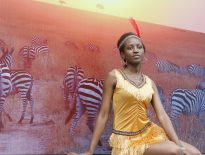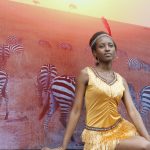Raindrops descended in brisk staccato like a hail of arrows from a vast column of archers. The streets were flooded to biblical proportions, yet no holy man pious and true had been forewarned, bade to build an ark and pair up beasts.
It had torn and tossed pylons like twigs, snatching them off the feeble ground like an elephant trunk uprooting mere saplings and hurled them at the mish-mash of trees, cars, animals, humans and every other thing that misshaped in the way of the waters, furious enough to turn the most rage-swollen Zambezi on its tail and send it back-flowing to its source.
A boy lay in bed, feverish, his tear-drenched mother mopping his brow which seemed to pour like the ruptured heavens. Next to her sat his siblings, silent as death beneath the pall. Food had been exhausted and the house, formerly a shelter was a death trap. Outside, the water flowed just beneath window-level; inside, the assault-weary roof began to give in and let through murderous pours. The bed had been moved many times, elevating it when mopping the floor proved a futile battle for the hunger-beaten against the apocalyptic celestial terror. They sat with their ankles in the rising pool, taking pains to keep him warm and dry.
His mother cried for his life about to be taken so soon and maliciously, and more from the confusion of an apparent betrayal. This was not the fulfilment of the promise made to her at his birth.
Thirteen rains before, a youth barely moulded into readiness for womanhood lay feverish, writhing like an exorcism. Sweating profusely, like the boy she was bridging into the world would during the great calamity. The seed of the wind like Helen of Troy, Jehoshua ben Yosef, and Guatemala Buddha. Immaculately conceived of a virgin, this fact proved by unbelieving old women whose speciality was such inspection and midwifery. This truth terrified them and they would not deliver the baby. Her parents believed neither the proof nor their daughter, so they threw her into the wilderness to return only with the bastard’s sire. The girl, knowing she had known no man crawled into the darkness and consigned her fate to the stars.
The owners of the sky are cruel, she thought, watching the ripples form around her ankles from the water streaming from the roof. How did they bring a life into the world under such extraordinary circumstances only to take it so maliciously?
While she wept and shivered more from sorrow than cold, she cast sight across the darkness to the form of her son. One glance revealed the difference. Formerly he had been sweating, gasping for air with a gaping mouth and heaving his chest high with the effort, but his mouth had stilled as had his chest. The sweat had seized streaming, the pain was gone and he stopped quivering like a reed on the river edge. Death had come at last. One after the other the living in the room raised a crescendo of wailing. They had long-anticipated death but the confirmation was vicious, what they did not know at the time was that before the water took their lives, they would contemplate eating him.
Thirteen summers before this time of reason manifesting as thoughts of splitting wardrobes for firewood and devouring corpses, the bereaved woman was found by an old man beneath a mangwe’s height, crouching, with her head buried in her knees and palms hugging opposite upper-arms, shivering to the not-so-distant laugh of hyenas and coughs of leopards. The old medicine-man had not said a word to her, just towed her by the arm to his home. Only his wife spoke to her, she cared for the girl like her own. Often she felt uncomforted by the luxuries allowed her by the old woman, a body inhabited by raw energy and kindness, as industrious as the sun. The girl tried to help with a broom here and water-gourd there, but she was not allowed to do much, she needed rest and the child she would bear could not be put to risk.
She often wondered what life would be fruited from her curious circumstance, the one whose birth the old woman anticipated like some await the fabled return of their Christ. She found out on the day you were born, I shall speak of these things with you, but first, let us talk of what you saw when you died.
You wandered into a barren land as dry as the one that spits you into it was wet. The sun was raw and bright but you did not feel it nor did it hurt your eyes. Your feet, light as light, seemed to step not directly on the dust. You wondered how or why; it was your spirit, what the Bantu call your ena, your true being not your physical form that walked. As suddenly as you had appeared, darkness crept around and engulfed you, in the next twinkle you sat by a borne fire whose tongues seemed to lick the sooty fabric of heaven. Beside you sat an old man who introduced himself as The Lost Immortal.
You studied him pensively while he scowled into what your people call a jackal’s fire like a harbinger whose gaze is trained on the horizon, watching hellhounds only he can see pacing forth to extinguish a life. When he spoke again he said, “I am Lumukanda, born of perishing form like you, transmuted to deathlessness in the kiss of the goddess Nanavanhu-Ma.” You startled, unbelieving the humourless mouth speaking to you though at the fire. It did not feel like a dream, all too real but you could not fathom the nature of it for you were not yet aware of your own death.
Without facing you even once, he told of the time many eons folded over, when the Phoenicians settled in the navel of Africa and raised great empires under the reigns of Karesu and Makira-Kadesi. Yes, they were strange tales, stranger still how he had been transfigured from the dust-bound being to the realm of eternal blinkers to lead slaves off the yoke in Spartacus fashion. You did not have to speak your disbelief or the confusion that beset your young spirit, he read it plain for child, immortals can read thoughts and hearts as clear as hieroglyphs. So he said he would show you and he did.
You soared like the eagle’s feather against the sky, across vast lands of foreign frontiers and times like the unfettered imagination, fattening your eye with scenes of empires raised and razed. From these heights, your spirit-form unburdened by the cumbersomeness of human flesh peered on the Eastern horizon of time itself where I, the Great Spirit, Ageless of a Thousand Names laboured, smithing the very sun from smokeless fire. The Muslims believe it is from this smokeless fire that I created the jiin, what they call evil beings of unseen realms that assume many forms in the land of men. Some call them demons and aye, I created them as dark as noon is bright, they serve my will, good and evil both do. It is the necessity of opposites, day was born with night, I created all things so and called them perfect. The pendulum must swing both directions, in equal proportion. Extremes must exist in pairs is the first law of creation. You must know these things to fulfil your purpose.
While you saw the formation of all that is from my very being and the creation of life as I delegated through the tri-nippled goddess Amarava and the spouse I gave her, the grotesque Odu, Tree of Life, your flesh was the object of discussion in the mortal realm. Your siblings suddenly overpowered by the demon they could no longer reign contemplated relieving your bones of your flesh. Contemplated? No, the elder spoke out.
“Mother, may we eat him?” he said after a long silence punctuated with sniffs and whimpers.
“You cannot eat your brother, we are not cannibals.” She replied curt and brisk.
“No,” he spoke quietly, not to his feet but to her eyes, unlike his regular manner. “But we are hungry and we shall soon die like him if we do not eat.”
“We would rather die than be reduced to that.” She said dismissively. On an ordinary day with the sun in his place and the mulberry bush’s roots firmly in the ground, she would have threatened him with a switch or gone right on and crisscrossed his skin with it. But on an ordinary day they would not be discussing eating a corpse.
She wondered what had brought the child to such horrid thoughts, what she did not know was that the shock of watching you die had brought a naked realization to the young mind. The two children had known of death when it had swallowed their father, a good man whose abundant love did not differentiate you from them. But they always thought death was for ‘old people’. With you gone their young minds were catapulted beyond their years in cognition and that swift flight without a knowledgeable guide had brought them distorted truth. Surely they could also just vanish to memory, and the beast clawing at their inner-bellies could eventually leave them dead but not so soon, hunger is a cruel killer whose deathblow comes after much begging and a-begging. The child had come to one conclusion: eat or die, rather eat the dead than die of hunger. But a child could not think these thoughts alone, I who made all things uneven and called them perfect hid the words in his heart for I am temptation and salvation. Why would I? So that the faith of the one you call mother may be tested. Truth is fortified in testing. That is why no matter how much she chided and scolded his mind could not be steered off that course.
They argued long and loud, while busy at loggerheads they did not see the younger one, almost knee-deep wading away. They only saw her return with that zinc dish your mother used when she cut the throats of chicken. She brought a knife as well, to carve your meat off. When your mother saw this she sank in spirit below the fabled hell, took the utensils both, laid the dish on her lap and the knife to her trachea. “Eat me instead my children.”
You were far from all these things. I know you would have let them eat you had you a say in the matter though your mother would not. She believed in the old prophecy of the medicine man who kept her alive while you lived in her belly. When you were born he held you high above the searing flame glistening her sweat-polished brow and spoke for the first time since she lived with him, blessing you in tongues of the Wakabi, tongues older than Lumukanda himself, not spoken since man was but a speck on the vast face of the blue ball. He was the first to call you by name, the name pronounced by the wise owls across eons’ night. As they prophesied, the son of Nozala the Pure would answer to the name Luzwi. You saw these things in the voyage of your spirit.
Before you witnessed the scene of your birth oh Luzwi, you had to see the most horrible scenes, the plight of your fellow men in the hands of foreign masters. They came across the big pond on ships and took men and women like you, bound them in savagery undeserved even by beasts. They were bred like livestock and worked like bleeding machines as expandable as an autumn leaf.
You saw them come again and live among you with their flags planted in your soil. In the streets beneath the firmament of the very city you call home where the black vagrant makes bed walked these foreigners, elbowing the natives off their podiums of civilization. This city you call home, Bulawayo, divided like the patches of earth your sister played scotch on. In the East lived the masters, the servants in the West. Only a decade before you inhaled air the black man needed a pass to cross the divide.
It infuriated you, realising how you could have been one of those men living on the other side, the Western side, facing the sun’s whips in his gallant rise, blinded by his descent to a wifeless bed beneath the halo of factory smog. She would be somewhere in the Reserves where the settlers forced the natives from fertile lands. Missing her would only make the sock happier while she stumbled maybe in Gwaai through vicious terrain of sandy ground with no pity for bare feet. If you missed her more than the sock could compensate you would get a letter to allow her visit. The letter was necessary for an old time-twisted knave; the Commissioner owayekhokhoba would regularly inspect the rooms to exorcise any female disrupting the design of black men barracked like monks in that place named Makokoba after the gnarled bat.
You had to see these things in more vivid detail than the other time-swallowed scenes for this is from where you hail. And see you did. How you wept seeing your king’s pride razed and in pure disdainful mockery the victor erected his ‘State House’ in its stead in that place now known as Sorcetown. Rage tormented your soul when you watched the black kids of Mzilikazi, the squalor named after a great warrior-king, raiding bins in North End for the saliva of the settlers. The latter would eventually wrap their leftovers in foil before placing them in refuse bins. The black kids called this practice ukudikila.
At this point you were swollen with infernal wrath, blue flame of pure and livid hatred for the white man leapt in you; yet kindling this flame was not the purpose of the excursion.
Read The Men from the East – A Short Story by Edith Knight, Kenya
To calm your spirit, you were shown merrier scenes of coexistence in those times of turmoil. That milky lad you saw gulping opaque beer with his sooty brethren was later to carry the flag of Zimbabwe on his back in England, the mother of the tyrants. His name is Bruce Grobbler. Those dust stockinged lads that kicked a plastic ball about with their black peers are Jack and his brother Mark Watson. You saw black and white kids playing war games on that land where Lobengula’s cattle kraal once stood, slinging mud from switches. One black boy whose mind is preoccupied with the national condition wraps a pebble in his mud, slings it and knocks a white boy pink. The enraged victim picks up his bicycle, peddles off to return with his pellet-gun. Twang! Snaps it in half, reloads, twang! You laughed and I smiled, finally you understood what a man of your shade, born across oceans, a descendant of the stolen ones once dreamt. His name was Martin Luther King Junior, and he dreamt of men being judged by the content of their characters not the colour of their skin. You had learnt that the true shade of a man lies in his heart.
It was imperative that you understand or you would blunder like your leaders who braved the hail of warheads that you may enjoy rain; serenading and seducing death-spangled nights with Kalashnikov baritone and the soprano of tingling cartridge-shells, with bayonets cut down the foreign Caesar and birthed a new nation. They fought for justice, preached reconciliation yet when their soles echoed in the halls of the oppressor their souls were possessed by the horrors they had exorcised. The Gabriels, the angels turned demons. I wept so, I weep still.
Your mother had the blade to her neck ready to draw her blood that your siblings may drink nourishment from it than have them scar your body. Why would she make this sacrifice seemingly meaningless? Was it not more sensible to eat what was already dead?
She believed young one. That ancient man who held up your woeful form with its umbilical cord still dangling, yet unwashed of blood and fluids of birth was Lumukanda, The Lost Immortal. He told the prophecy to your young mother still feeble from labour. Luzwi, your name has been whispered by many prophets, madmen, izanuse and keepers of knowledge of this continent across eons. They spoke of The One To Come, who would liberate mankind from a great calamity. I chose you before your mother was formed in the womb, before the beast that now stirs anarchy like a bull digging his hoof into the ground was. I the Eternal One, who created himself and everything in the ever-expanding universe from myself. All is a part of me, your very soul too.
Do you know what it looks like? It is an orb the size of your head, a perfect sphere, transparent, inhabited by two worms that glow like fireflies. One is blue, the other red. Ever moving, twining, untying, dancing, writhing. The red is pure evil, the other unadulterated good. A female’s soul has wings like an ant lion’s, yours and every other male’s is wingless. I am good and evil, you I have appointed to bring pleasure to my heart by restoring equilibrium to an aberrated world.
After you had seen your birth and the proclamation of your mission your education was complete. You left the ancient wanderer warming his equally ancient scrotum by the eternal fire. Your mortal form shook and coughed, blinked, your mother sighed, let down the blade and embraced you. At once the great storm abated, the sun shimmered through and the water shined like sheet silver. You were back among the living, with no recollection of your spirit journey.
You have grown now, your beard is heavy and your eye is weary of the world of men more foul and maggot-ridden than at the time of the cyclone. The age of your remembrance is ripe. As you read these things on the wall of this cave written in a language of symbols you understand not how you comprehend, your sun is yawning in its cradle. Rise forth, fulfil your purpose, I God command it, Dark Messiah.
-This story was greatly inspired by Credo Mutwa’s Indaba My Children, a collection of African folklore and mythology. I found it imperative to take some of the characters from the African narrative and build a story around it.









